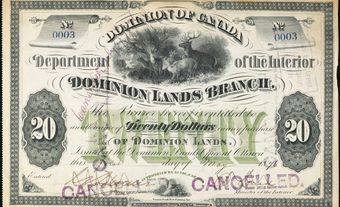In Manitoba Metis Federation Inc. v. Canada, the appellants (plaintiffs) — including the Manitoba Metis Federation Inc. (MMF) — charged that Canada failed to implement sections 31 and 32 of the Manitoba Act, 1870. These sections had promised land to the children of the Red River Métis in Manitoba, and recognized existing Métis land ownership. Although the MMF lost the case in 2007 and in a 2010 appeal, the Supreme Court of Canada ruled in its favour in 2013. The Supreme Court stated that in failing to follow the land grant provision, the Crown had not taken diligent action to fulfill its constitutional obligation. In response to this case, the Canadian government and the MMF signed a memorandum of understanding in 2016 to explore talks on reconciliation and develop a framework for negotiating a solution.
Historical Context
The Manitoba Act of 1870 promised to set aside 1.4 million acres (5,666 km2) of land, including what is now Winnipeg, for the 7,000 children of the Red River Métis. Section 31 of the Act stated that the lieutenant-governor was to “select such lots or tracts in such parts of the Province as he may deem expedient,” referring to a portion of lands to be divided among the children of the Métis living in Manitoba at the time. Canada had agreed in section 32 to recognize existing Métis land ownership.
This deal was meant to settle resistance by Red River Métis who were struggling to hold on to their land amid expanding white settlements. It was to ensure that Métis communities had an advantage in the new province. Instead, the land was distributed through a random lottery over 15 years, beginning in 1876. (See also Métis Scrip in Canada.) This issue remained a sticking point for Métis people in Manitoba ever since and was the driving force behind the launch of the Manitoba Metis Federation’s (MMF) case against the federal government. The MMF wanted a declaration that the government had breached its fiduciary duty to the Métis. This would help them in future negotiations with the Governments of Canada and Manitoba toward a land claims agreement.
Trial Case and Ruling
In 1981, the MMF took their case to the Manitoba Court of Queen’s Bench. They argued that the federal government had failed to give them the lands promised in the Manitoba Act, which went against the fiduciary duty and honour of the Crown. The MMF also wanted the courts to recognize that certain laws passed by the Manitoba government were invalid if they interfered with the implementation of the Manitoba Act.
After 26 years in litigation, the MMF lost the case in 2007. Justice MacInnes dismissed the action, finding that while government error and inaction had caused lengthy delays in implementing the Manitoba Act’s land provisions, the Crown had neither a fiduciary duty nor one based on honour in this matter. In his view, in order to claim the government had a fiduciary duty, the Métis needed proof that they had held land collectively before 1870. MacInnes ruled that since evidence showed the Métis had held their lands individually, the claim failed. Further, Justice MacInnes stated that the claim was filed too late, barred by limitation periods and the delay. While he decided that individual plaintiffs could bring forward the claim, the MMF could not.
Appeal Case
The MMF appealed the trial court’s ruling in the Manitoba Court of Appeal but lost their case in 2010. The court rejected the view that Aboriginal title was essential for the fiduciary duty claim but did not find it necessary to make any decision regarding the same claim. The court rejected any claim regarding the honour of the Crown.
Supreme Court Decision
In March 2013, the Supreme Court of Canada granted the MMF’s appeal. It ruled that the federal government had failed to implement the land grant provision set out in section 31 of the
Manitoba Act, 1870, as per the honour of the Crown. The federal government, the court decided, was constitutionally obligated by section 31 to fulfill its promise to the Métis: “The ultimate purpose of the honour of the Crown is the reconciliation of pre-existing Aboriginal societies with the assertion of Crown sovereignty.”
Impact of Supreme Court Ruling
Though the Supreme Court decision did not order any remedies, the federal government, in 2015, appointed a ministerial special representative on Métis engagement to “explore ways to advance dialogue on reconciliation.”
In May 2016, the Canadian government and the MMF signed a memorandum of understanding to “advance… exploratory talks on reconciliation” in response to the 2013 Manitoba Metis Federation Inc. v. Canada decision. The MMF hopes to one day negotiate and design a land claims agreement with programs and initiatives that will benefit Métis peoples.

 Share on Facebook
Share on Facebook Share on X
Share on X Share by Email
Share by Email Share on Google Classroom
Share on Google Classroom








